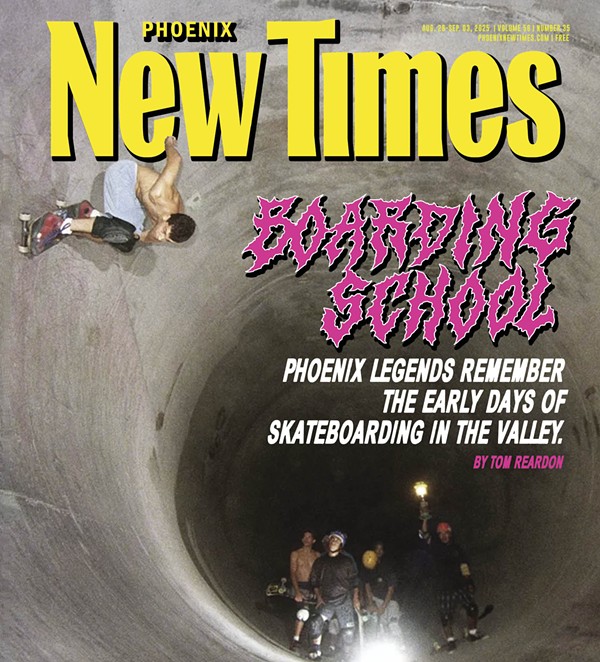Then something happened. Theatre took a dive and came up covered in revivals and road shows. These days, we're more likely to see a remount of a musical from several seasons ago (how many times can Six Women With Brain Death be resuscitated?) or a sloppy sequel (witness the latest version of Guv) than we are a world premiere.
There are actually a couple of pretty solid reasons that the state of theatre arts has gone south in the past few years. The advent of more national touring companies has cut into ticket sales at local playhouses, and has changed the standards of audiences who are seeing those shows. The thinking seems to be that theatregoers who are spending big bucks on bus-and-truck pageants like The Phantom of the Opera are less likely to seek out simple two-acts at the local black box. So, in an attempt to recoup last year's losses, many companies have abandoned risky material in favor of safer fare that's likely to sell tickets.
Like Theater Works. Before it got booted out of its original home--a former tack store out on the west side--this bastion of theatrical war-horses could be counted on for at least one imaginative production every year. While construction is completed on the company's new facility at 91st Avenue and Thunderbird in Peoria, its productions are staged in a temporary space just this side of Sun City. With a more mature audience to please, artistic director David Wo is taking no chances. Last season, his roster read like a pile of passe playbills from a Poughkeepsie dinner theatre. This year it's worse.
Wo defends his tired choices (which include a production of Hello, Dolly! that opens mere minutes after the Carol Channing road company leaves the Orpheum in February) by pointing to the bottom line. "Our expenses have tripled since we lost our space," he says. "We built a season that would guarantee more subscription sales to an older audience." Wo insists that, once his company moves into its permanent home, he will return to presenting more balanced fare. The new facility will include a pair of playhouses, and Wo and company plan to present controversial new material on the smaller stage. "In the meantime," he says, "I don't want to go out of business."
Perhaps Wo is taking a cue from Phoenix Theatre. While its playhouse was being refurbished in 1994, that company was also homeless, and lost a ton of money during a transient season that found its plays being performed in a different location every month. "We've been operating under a deficit ever since," says managing director Denise Ford. "We're trying to recover our losses by presenting a foolproof season."
Foolproof, in this case, means mostly dull. It's hard to imagine that anyone wants to see Dial M for Murder, which the company will present next month. But Ford claims that PT denizens asked for this weary murder mystery by name. "Our current season is based on audience surveys," she says. "We discovered that subscribers want recognizable product." Although artistic director Michael Mitchell has thrown in a couple of untried plays at season's end, most of the rest of his choices are the sort of bland fare that marked the company's community-theatre days.
Phoenix Theatre's ongoing transition from community to professional status also accounts for its prudent choices. While it gears up to compete on a professional level, the company is charged with paying more of its actors each season. "That means more expenses," Ford says, "and less risky material."
In the meantime, we're up to our eyeballs in Neil Simon. Seven of the playwright's comedies will be dusted off this season by both community and professional companies. "It's a sad time economically for theatre," muses playwright-actor Michael Grady, who's in charge of publicity for Arizona State University's theatre department. "Any theatre loses its margin of error when it's only looking at the bottom line. You can't expect your audience to take a show on faith until you've established a rapport with them." Usually, that means producing shows that patrons already know.
Some plucky young producers refuse to take that route. "We could have produced a Simon play just to make money," says Rusty Ferracane, co-founder of the fledgling Actors Group. Instead, after the troupe lost money on a failed production of The Grapes of Wrath last season, its officers chose to reorganize as a not-for-profit organization rather than stage a cash cow. "We're applying for grants and planning a fund raiser in December," Ferracane reports. "There's no point in doing a 42nd Street in order to fund something new. We started the company to produce material that wouldn't be seen here otherwise. We plan to stick to that."
There's an upside to the abundance of reruns being produced here, according to actor Radford Mallon. "A lot of us are motivated to find and produce new plays ourselves," says Mallon, who recently co-founded Whenever Productions. "We're mounting shows that we want to see and act in. We don't have to answer to a board of directors or worry that our subscribers will be offended and cancel their subscriptions."
Mallon hopes that audiences will stay in their seats next month when his company unveils its first production. Patient A is based on the story of the late Kimberly Bergalis, who claimed she contracted AIDS from her dentist.
"Several local actors were anxious to do this play, but no established theatre would touch it. So we started our own."
Unfortunately, few other companies are taking such risks. While Actors Theatre of Phoenix and Arizona Theatre Company continue to push the envelope with untried material, most of the remaining professional and community theatres aren't taking any chances. Until they do, it's up to the little guys to prove to audiences that a play can succeed even if an actor in a Lucite mask doesn't drop a chandelier on them.
--Robrt L. Pela








